Epigenetics: A New Bridge between Nutrition and Health.

Why Your DNA Isn’t Your Destiny.
Epigenetics can be defined as somatically heritable states of gene expression resulting from changes in chromatin structure without alterations in the DNA sequence, including DNA methylation, histone modifications, and chromatin remodeling. Over the past decades, epigenetic studies mainly have been focused on embryonic development, aging, and cancer. Presently, epigenetics is highlighted in many other fields, such as inflammation, obesity, insulin resistance, type 2 diabetes mellitus, cardiovascular diseases, neurodegenerative diseases, and immune diseases. Because epigenetic modifications can be altered by external or internal environmental factors and have the ability to change gene expression, epigenetics is now considered an important mechanism in the unknown etiology of many diseases. Such induced epigenetic changes can be inherited during cell division, resulting in permanent maintenance of the acquired phenotype. Thus, epigenetics can provide a new framework for the search for etiological factors in environment-associated diseases as well as embryonic development and aging, which are also known to be affected by many environmental factors.
In the nutritional field, epigenetics is exceptionally important, because nutrients and bioactive food components can modify epigenetic phenomena and alter the expression of genes at the transcriptional level. Folate, vitamin B-12, methionine, choline, and betaine can affect DNA methylation and histone methylation through altering 1-carbon metabolism. Two metabolites of 1-carbon metabolism can affect methylation of DNA and histones: S-adenosylmethionine (AdoMet), which is a methyl donor for methylation reactions, and S-adenosylhomocysteine (AdoHcy), which is a product inhibitor of methyltransferases. Thus, theoretically, any nutrient, bioactive component, or condition that can affect AdoMet or AdoHcy levels in the tissue can alter the methylation of DNA and histones. Other water-soluble B vitamins like biotin, niacin, and pantothenic acid also play important roles in histone modifications. Biotin is a substrate of histone biotinylation. Niacin is involved in histone ADP-ribosylation as a substrate of poly(ADP-ribose) polymerase as well as histone acetylation as a substrate of Sirt1, which functions as histone deacetylase (HDAC). Pantothenic acid is a part of CoA to form acetyl-CoA, which is the source of acetyl group in histone acetylation. Bioactive food components directly affect enzymes involved in epigenetic mechanisms. For instance, genistein and tea catechin affects DNA methyltransferases (Dnmt). Resveratrol, butyrate, sulforaphane, and diallyl sulfide inhibit HDAC and curcumin inhibits histone acetyltransferases (HAT). Altered enzyme activity by these compounds may affect physiologic and pathologic processes during our lifetime by altering gene expression.